Japanology Plus - Season 5 / Year 2018

Season 5 / Year 2018

Episodes

Ocean Fishing
With the sea on every side, Japan is a leading fishing nation, home to some of the world's most productive fisheries. Various methods have been developed to improve catches, and in recent years new initiatives have been launched to revitalize the fishing industry. This time on Japanology Plus, our theme is ocean fishing. Our expert guest is Prof. Osamu Baba from Tokyo University of Marine Science and Technology. In Plus One, Matt fishes in the mud for "aliens."

The Police
Japan is widely acclaimed as one of the world's safest countries, and the police contribute greatly to this outstanding national reputation. Beyond solving nearly all murders and many other crimes, the police in Japan are a familiar community presence, trusted by adults and children alike. This time on Japanology Plus, our theme is the police. Our expert guest, Masahiro Tamura, served in the police force for 36 years and is now a university professor. And in Plus One, the work of a police sketch artist.

Japanophiles: Stephanie Tomiyasu
The long history of Japanese culture is replete with various forms of traditional music and storytelling, many of which have been featured on Japanology Plus. This time our focus is on joruri, one such traditional performing art. Our guide is a unique practitioner of that art: Stephanie Tomiyasu, an American who trains under one of Japan's leading joruri instructors. Tomiyasu's life in Japan and her position as a foreign joruri practitioner are the subject of our latest Japanophiles edition.

New Trends in Logistics
Japan, like the rest of the developed world, has taken a serious shine to online shopping. 3.9 billion home deliveries were made in 2016 alone, and that volume doesn't show any signs of slowing down. Japan's wholehearted embrace of online shopping is fueled, in part, thanks to the country's efficient shipping infrastructure, in which next-day delivery is the norm. Hit the streets in Japan and you're bound to spot uniformed men and women delivering packages by truck, scooter, bicycle, and on foot with speed and dedication that may surprise those from other countries. But the ever-increasing number of packages is putting strain on these workers and the logistics that support them. On this edition of Japanology Plus, we take a look at the system as it exists and some of the new ideas that will be needed to keep it running in the future.

Game Arcades
Japan's game arcades are packed with all kinds of entertainment and game machines are found all over the country. They're not just for children—they attract families, friends, and people of all ages. This time on Japanology Plus, our theme is game arcades and what they mean to people in Japan. Our expert guest, Masatoshi Tamura, has 40 years of experience working for a major developer of arcade games. And in Plus One, how to get yourself certified as a player of Japan's ubiquitous crane games.

Snow Removal
In winter, many parts of Japan accumulate massive amounts of snow. While the snow generates significant challenges in daily life, roads, railways, and airports generally keep functioning. This time on Japanology Plus our theme is snow removal. We see ways to tackle the snow and keep everyday life running smoothly throughout the winter. Our guest is Natsuo Numano, who has studied and written about snow-related matters. And in Plus One, safe ways to get snow off a roof.

Shopping Streets
As in much of the industrialized world, a significant amount of shopping in Japan takes place in towering shopping malls and chain supermarkets. But cities and towns throughout the country are also home to a more traditional form of shopping thanks to their shotengai, or shopping streets. While these traditional shopping streets are facing numerous challenges, they're also being reevaluated for their friendly atmosphere and contribution to the social fabric of their neighborhoods. In this edition of Japanology Plus, we take a stroll down several of these shopping streets and find out why they're worth a visit.

Japanophiles: Bjorn Heiberg
Bjorn Heiberg is a connoisseur of the cutting edge of Japanese knives. Japanese swords are famous around the world for their unrivaled quality. These days, smiths use the same techniques that were perfected for sword-making to craft top-quality knives. Heiberg is not a knife maker himself. Rather, he owns cutlery stores where he sells the finest knives made by the most skilled smiths. Many of these smiths can be found in Sakai, Osaka, one of the centers of the Japanese knife-making tradition.
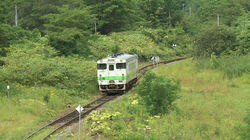
Regional Transport Crisis
Fewer people are using trains in outlying regions of Japan, and about one third of Japanese rail lines operate in the red. Because of this, regional rail companies have been shutting down money-losing lines or expanding into side businesses. This time on Japanology Plus, we look at the crisis regional railways are facing. Our guest, Hiroaki Oshima, works at a private-sector thinktank studying Japan's systems for moving goods and people. And in Plus One, hiking a famous old rail route in Gunma Prefecture.
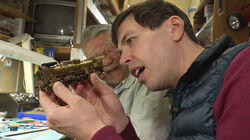
Miniature Culture
The Japanese fondness for life in miniature dates back centuries, and from it arose many types of intricately crafted tiny items that are still common in everyday life today. This time on Japanology Plus, we look at the Japanese enthusiasm for crafting and appreciating miniatures. Our guests include the internationally acclaimed diorama artist Takuji Yamada. And in Plus One, the difficulty of punching a tiny hole in a piece of metal that is to be used in a realistic model of a train.
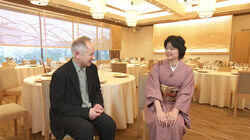
Marriage
Japanese weddings are the event of a lifetime, whether they're held at a Shinto shrine, Buddhist temple, or Christian church. But the number of weddings has dipped in recent years amid social trends toward staying single or marrying late. Even so, services that assist with getting married are proving to be popular. This time, we look at Japanese weddings. Our expert guest is Noriko Nagamine, a magazine editor who has written extensively on weddings. And in Plus One, a matchmaking bus tour!
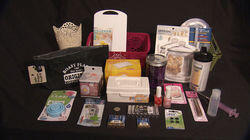
100 Yen Shops
Over the past year, 98% of people in Japan shopped at a 100 yen store. These shops were once associated with cheap, low-quality merchandise. Over the years, however, quality has been improving, and now 100 yen goods are often used in everyday life. Exactly how do 100 yen shops contribute to general well-being in Japan? This time on Japanology Plus, our expert guest is Emiko Masao, who writes an influential blog about making the most of what 100 yen shops offer. And in Plus One, ways to use 100 yen items in a DIY project.

Deep-fried Food
Japanese department stores and supermarkets display whole cases of tempura, tonkatsu, croquettes, and other classic forms of deep-fried food. It's a popular choice when eating out, as well as when dining at home. This time on Japanology Plus, we explore some of the varieties of deep-fried food that are most loved in Japan. Our guest, food journalist Chieko Mukasa, is an expert on Japanese culinary culture. And in Plus One, how to make a Nagoya delicacy: jumbo fried prawn.
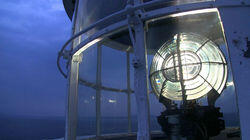
Lighthouses
Exposed to the fury of waves and weather, lighthouses hold a cherished place in Japanese hearts. In recent years, the advent of GPS and radar has led to the demolition of many lighthouses, but they live on in the memories of those who looked to them for guidance. This time on Japanology Plus, we cast light on the subtle appeal of lighthouses in Japan. Our guest is Mayuu Fudo, editor of a free magazine dedicated to the appeal of lighthouses. And in Plus One, memories of life as a lighthouse keeper.
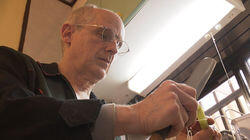
Japanophiles: David E. Wells
David E. Wells is an American chef who has been preparing Japanese food professionally for 35 years. The delicate dishes he creates are firmly grounded in the core values of Japanese cuisine. Instead of working at a restaurant, he provides catering services for clients who want to entertain at home. This time on Japanophiles, Wells shares his insights into the lifelong process of learning to appreciate the many possibilities of Japanese ingredients.
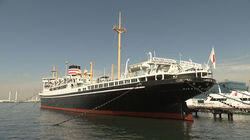
Industrial Heritage
For over two centuries, Japan's military government kept the country isolated. Then in 1868 a national transformation began, culminating with a period of growth after the Second World War that came to be known as the "economic miracle." This time on Japanology Plus, our theme is industrial heritage. Our guest is Osamu Kamei, the vice-director of Center of the History of Japanese Industrial Technology at the National Museum of Nature and Science. And in Plus One, Japan's silk heritage.

Graves
In Japan, graves are found at temples or in independent cemeteries. They are places where families regularly pay respects and also report on key events in life. This time on Japanology Plus, our theme is graves. What role do they play in everyday life, and how are memories of the deceased preserved in Japan? Our guest is Yoko Nagae, who has traveled to 45 countries to study funeral cultures around the world. And in Plus One, new types of graves.

Rice Cultivation
Rice has been an integral part of life in Japan for over 2,000 years. Traditionally, one alternative name for Japan is mizuho no kuni, or "the Land of Abundant Rice." As we learn on this edition of Japanology Plus, when society shifted from hunting and gathering to agriculture during the Yayoi period, communities formed around rice paddies to facilitate the cooperation necessary for bringing in a plentiful harvest. This organizational structure laid a foundation for Japanese society, and the effects can still be seen in Japan's cultural identity and people's shared beliefs today.

The Ogasawara Islands: A Multicultural Heritage
This time on Japanology Plus, our theme is the Ogasawara Islands, a remote archipelago with a unique ecosystem and multicultural heritage. Located 1,000 kilometers off Japan's Pacific coast, the Ogasawara Islands were first settled by a group of Westerners and South Pacific Islanders, who interacted with later Japanese settlers to bring forth a unique culture. Our expert guide is Sho Sebori, a direct descendant of the American who became the leader of the first community on the islands.

The Ogasawara Islands: A Turbulent History
At first glance, life on the Ogasawara Islands may seem akin to living in paradise. Known for their amazing range of biodiversity and beautiful natural scenery, the islands were registered as a UNESCO World Heritage Site in 2011. However, perhaps an even more important, yet much lesser known, part of the islands' identity is their significance during World War II and the events that transpired on the islands during the post-war occupation.

Japanophiles: Bruce Gutlove
Bruce Gutlove is an American who for decades has contributed to the growing reputation of Japanese wines. His career highlights include two wines that were served at G8 Summits in Japan. For many years he worked at a vineyard in Tochigi prefecture that offers workers with developmental disabilities to explore their potential. Nowadays he has his own winery in Hokkaido. This time on Japanophiles, Bruce Gutlove reviews his career and discusses the challenge of making great wine in Japan.

Roadside Stations
When people from many countries imagine a regional roadside pit stop, what comes to mind might be the bare essentials: gasoline, a few toilets, and maybe a convenience store. But Japan's regional pit stops, which are known as "roadside stations," are multi-faceted centers of community life with farmers' markets, unique family-friendly activities and more. Why are Japan's roadside stations a cut above, and what do some of the country's most outstanding stations have to offer? That's the theme of this edition of Japanology Plus.

Summer Resorts
In Japan's hottest months, many people head out to summer resorts. While the concept initially came from Western expatriates, summer resorts then evolved along uniquely Japanese lines. These days they offer activities that cover a range of outdoor thrills and entertainment for the whole family. Our guest is Hiroyuki Yasujima, a professor of tourism and community studies at Atomi University who has studied summer resort areas around the world. And in Plus One, a summer resort offering something for everyone.

Yurei: Japanese Ghosts
Japanese ghosts (yurei) often appear in a type of painting called yureiga ("ghost pictures"). One feature of this art is the frequent appearance of female ghosts. Japanese ghosts, however, come in various forms, all of which reveal aspects of the world beyond. On this edition of Japanology Plus our guests are Takahiro Saeki, an expert on Japanese tales of the supernatural, and Fuyuko Matsui, a nihonga painter who specializes in yureiga. And in Plus One, a temple with some precious ghost pictures.

Radio Calisthenics
Each morning millions of Japanese start their day with radio calisthenics. This time on Japanology Plus, our theme is radio calisthenics. Practically everyone in Japan—young and old—is familiar with these exercises, which started 90 years ago and spread to parks, schools, neighborhood associations and workplaces all over the country. Our guest is nonfiction writer Hidemine Takahashi, who has studied radio calisthenics closely. And in Plus One, some of the key points of the exercises.

Underground Shopping Streets
Japan is a world leader in utilizing underground space, and that's exemplified by its network of underground shopping streets. There are around 80 of these subterranean shopping centers across the country, selling the goods and services that Japanese people need in their daily lives. This time on Japanology Plus, our theme is underground shopping streets. Our guest is Yu Hiroi, an expert on urban disaster mitigation. And in Plus One, we visit Japan's oldest surviving underground shopping street.

Japanophiles: Jagmohan S. Chandrani
This edition of Japanophiles centers on Jagmohan S. Chandrani, an Indian who has been in Japan for four full decades. We hear how he became known as a founding father of the largest Indian community in Japan. Through his story, we get an insight into the experience of moving to Japan from abroad and the culture that immigrants bring with them. Chandrani has spent almost all his life in Japan in Nishi-kasai, a commuter town on the eastern tip of Tokyo. When he arrived, it was covered in farmland and didn't even have a train station. It has since undergone massive urban development and is now known to some as "Little India."

A Sense of the Divine
Japan's many shrines and temples are not interchangeable; they represent very different customs, and offer different objects of prayer. Many Japanese people have a distinctive spiritual outlook that prompts them to pray at both shrines and temples. This time on Japanology Plus, our theme is a sense of the divine. Our guest is Daiko Matsuyama, a priest at a temple in Kyoto who promotes understanding of Japanese Buddhism on a global scale. And in Plus One, ways to engage with a famous religious landmark in Tokyo.

Earthquake-resistant Architecture
Japan is a country with frequent earthquakes and protecting buildings is a key concern. Over the years people have developed many creative ways of achieving this. Certain techniques are found both in ancient wooden buildings and in contemporary skyscrapers. This time on Japanology Plus, our theme is earthquake-resistant architecture. Our expert guest is Atsushi Ueda, an architect and researcher. And in Plus One, we learn the secrets behind the durability of a traditional Japanese house.

School Sports Days
Every year, children in schools all across Japan take part in a sports day. It's one of the most important dates on the calendar, not just for the students, but for their parents too. This time on Japanology Plus, our theme is school sports days. Our main guest, sports writer Masayuki Tamaki, talks about their history, how they've changed, and their future. And in Plus One, Matt Alt follows a family as they prepare for, then attend, a primary school sports day.

School Satchels
Almost every primary school student in Japan uses the same type of school bag. These distinctive, blocky satchels are spacious, durable, and packed with clever features. This time on Japanology Plus, our theme is school satchels. We explore their history, production, and future potential. Our guest is Kuniyo Hayashi, the president of a long-established satchel-making company. And in Plus One, a primary school student shows us how she uses her bag on a day-to-day basis.

Aquariums
About 20% of all the world's aquariums are found in Japan. Many feature unique specialties, from jellyfish to frozen river scenery. Others borrow techniques from Japanese garden design. This time on Japanology Plus, our theme is aquariums. Our main guest is Hajime Nakamura, an "aquarium producer" who explains why these aquatic utopias are so enduringly popular. And in Plus One, Matt Alt goes behind the scenes at the Sumida Aquarium at Tokyo Skytree Town.

Onigiri: Rice Balls
With 10 billion eaten every year, onigiri (rice balls) are one of Japan's most popular foods. They combine rice, salt, nori seaweed and a filling to create a simple meal, perfect for eating on the go. This time on Japanology Plus, our theme is onigiri: rice balls. Our main guest is Yusuke Nakamura, Representative Director of the Onigiri Society and a man who personally eats 3,600 rice balls a year. And in Plus One, Matt Alt visits an onigiri specialty store to learn how to make one himself.

Japanophiles: David Stanley Hewett
David Stanley Hewett is a contemporary artist who specializes in ceramics and abstract painting. Japanese techniques, as well as ideas like bushido, play a huge role in his work. Hewett has been a resident of Japan since 1988. His artwork features prominently in major hotels, and his exhibitions regularly sell out. This time on Japanophiles, Hewett tells us about his life, his artistic processes, and what it is about Japan that inspires him so much.

Coffee
Coffee is consumed around the world, but Japan seems to have a special relationship with the beverage. On this edition of Japanology Plus, we dig deep into Japan's coffee culture and learn how the country first came into contact with coffee, how and why it fell in love with the drink, and even how Japanese coffee preparation methods have influenced cafe culture worldwide. Brew up a cup and dive in!

Meiji-era Advisors
2018 marks the 150th year since the beginning of the Meiji era, as well as the end of the age of samurai in Japan. Meiji means "Enlightened Rule," and the era lasted from 1868 until 1912. The ultimate objective at the time was "bunmei kaika," or civilization and enlightenment, which included modernizing the nation so that Japan could perform as a strong and respectable player in the world of international relations. The era was characterized by ambitious cultural, social, and political shifts. The focus of Japanology Plus this time is Meiji-era advisors, the foreign consultants behind many of these changes.

School Uniforms
Uniforms are a familiar sight in Japan, whether it's the jacket of a taxi driver, or the black suit of a new office worker. Among the most visible examples are the uniforms worn by middle and high school students. They often feature distinctive collars and buttons, originally based on naval or army clothing. This time on Japanology Plus, our theme is school uniforms. Our main guest, university professor Mami Bamba, explains what these outfits can tell us about Japanese society. And in Plus One, Matt Alt designs a brand-new school uniform.

Soba Restaurants
Soba, or buckwheat noodles, are served everywhere in Japan. But soba is more than just a food; it's also an auspicious way to end the year. This time on Japanology Plus, our theme is soba restaurants. Our main guest is Kyo Amemiya, editor-in-chief of a publishing company that specializes in cooking and food books. He introduces us to a variety of soba restaurants and points out some interesting takes on this classic dish. And in Plus One, Matt Alt learns about some amazing food delivery methods.
Recently Updated Shows

The Voice
The Voice is Australia's premiere singing competition, renowned for its unique Blind Audition process. The Coaches, all iconic musicians in their own right, look for one thing and one thing only: The Voice!

The Amazing Race Canada
The Amazing Race Canada will provide a uniquely Canadian take on the original series, with competitors discovering the world within the borders of Canada.

Days of Our Lives
Days of our Lives is set in the fictitious Midwestern town of Salem. The core families are the Bradys, the Hortons and the DiMeras, and the multi-layered storylines involve elements of romance, adventure, mystery, comedy and drama.
Beginning on September 12, 2022, DAYS became exclusive to streaming on Peacock.

Outlander: Blood of My Blood
Outlander: Blood of My Blood explores the lives and relationship of Claire's parents, Julia Moriston and Henry Beauchamp, and Jamie's parents, Ellen MacKenzie and Brian Fraser. The series centers on these two parallel love stories set in two different time periods, with Jamie's parents in the early 18th-century Scottish Highlands and Claire's parents in WWI England.